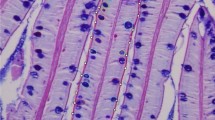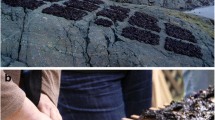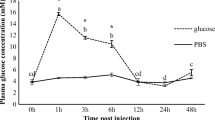Abstract
Largemouth bass (Micropterus salmoides) were fed with three diets containing 6%, 12%, and 18% wheat starch for 70 days to examine their impacts on growth performance, glucose and lipid metabolisms, and liver and intestinal health. The results suggested that the 18% starch group inhibited the growth, and improved the hepatic glycogen content compared with the 6% and 12% starch groups (P < 0.05). High starch significantly improved the activities of glycolysis-related enzymes, hexokinase (HK), glucokinase (GK), phosphofructokinase (PFK), and pyruvate kinase (PK) (P < 0.05); promoted the mRNA expression of glycolysis-related phosphofructokinase (pfk); decreased the activities of gluconeogenesis-related enzymes, pyruvate carboxylase (PC), and phosphoenolpyruvate carboxykinase (PEPCK); and reduced the mRNA expression of gluconeogenesis-related fructose-1,6-bisphosphatase-1(fbp1) (P < 0.05). High starch reduced the hepatic mRNA expressions of bile acid metabolism–related cholesterol hydroxylase (cyp7a1) and small heterodimer partner (shp) (P < 0.05), increased the activity of hepatic fatty acid synthase (FAS) (P < 0.05), and reduced the hepatic mRNA expressions of lipid metabolism–related peroxisome proliferator–activated receptor α (ppar-α) and carnitine palmitoyltransferase 1α (cpt-1α) (P < 0.05). High starch promoted inflammation; significantly reduced the mRNA expressions of anti-inflammatory cytokines transforming growth factor-β1 (tgf-β1), interleukin-10 (il-10), and interleukin-11β (il-11β); and increased the mRNA expressions of pro-inflammatory cytokine tumor necrosis factor-α (tnf-α), interleukin-1β (il-1β), and interleukin-8 (il-8) in the liver and intestinal tract (P < 0.05). Additionally, high starch negatively influenced the intestinal microbiota, with the reduced relative abundance of Trichotes and Actinobacteria and the increased relative abundance of Firmicutes and Proteobacteria. In conclusion, low dietary wheat starch level (6%) was more profitable to the growth and health of M. salmoides, while high dietary starch level (12% and 18%) could regulate the glucose and lipid metabolisms, impair the liver and intestinal health, and thus decrease the growth performance of M. salmoides.




Similar content being viewed by others
Data availability
The information that uphold the findings of this experiment are available from the corresponding author upon reasonable request.
References
Barka EA, Vatsa P, Sanchez L, Gaveau-Vaillant N, Jacquard C, Meier-Kolthoff JP, Klenk HP, Clement C, Ouhdouch Y, van Wezel GP (2016) Correction for Barka et al., taxonomy, physiology, and natural products of Actinobacteria. Microbiol Mol Biol R 80(1):1–43. https://doi.org/10.1128/MMBR.00044-16
Boonanuntanasarn S, Jangprai A, Kumkhong S, Plagnes-Juan E, Veron V, Burel C, Marandel L, Panserata S (2018) Adaptation of Nile tilapia (Oreochromis niloticus) to different levels of dietary carbohydrates: new insights from a long term nutritional study. Aquaculture 496:58–65. https://doi.org/10.1016/j.aquaculture.2018.07.011
Chen P, Wu XF, Gu X, Han J, Xue M, Liang XF (2021) FoxO1 in Micropterus salmoides: molecular characterization and its roles in glucose metabolism by glucose or insulin-glucose loading. Gen Comp Endocrinol 310:113811. https://doi.org/10.1016/j.ygcen.2021.113811
Cryan JF, Dinan TG (2012) Mind-altering microorganisms: the impact of the gut microbiota on brain and behaviour. Nat Rev Neurosci 13:701–712. https://doi.org/10.1038/nrn3346
Enes P, Panserat S, Kaushik S, Oliva-Teles S (2006) Effect of normal and waxy maize starch on growth, food utilization and hepatic glucose metabolism in European sea bass (Dicentrarchus labrax) juveniles. Comp Biochem Physiol A 143:89–96. https://doi.org/10.1016/j.cbpa.2005.10.027
Enes P, Peres H, Sanchez-Gurmaches J, Navarro I, Gutierrez J, Oliva-Teles A (2011) Insulin and IGF-I response to a glucose load in European sea bass (Dicentrarchus labrax) juveniles. Aquaculture 315:321–326. https://doi.org/10.1016/j.aquaculture.2011.02.042
Folch J, Lees M, Sloane-Stanley GH (1957) A simple method for the isolation and purification of total lipids from animal tissues. J Biol Chem 226:497–509
Ge YP, Chen WL, Sun M, Zhang L, Liu WB, Li XF (2022) Molecular characterization of farnesoid X receptor alpha in Megalobrama amblycephala and its potential roles in high-carbohydrate diet-induced alterations of bile acid metabolism. J Steroid Biochem 219:106065. https://doi.org/10.1016/j.jsbmb.2022.106065
Guo XZ, Liang XF, Fang L, Yuan XC, Zhou Y, Zhang J, Li B (2015) Effects of dietary non-protein energy source levels on growth performance, body composition and lipid metabolism in herbivorous grass carp (Ctenopharyngodon idella Val.). Aquac Res 46:1197–1208. https://doi.org/10.1111/are.12275
Guo JS, Fu YH, Wu ZH, Yu XJ, Guo YL, Liu JH, Zhang WB, Mai KS (2022) Effects of dietary carbohydrate levels on growth performance, body composition, glucose/lipid metabolism and insulin signaling pathway in abalone Haliotis discus hannai. Aquaculture 557:738284. https://doi.org/10.1016/j.aquaculture.2022.738284
Hemre GI, Mommsen TP, Krogdahl Å (2002) Carbohydrates in fish nutrition: effects on growth, glucose metabolism and hepatic enzymes. Aquacult Nutr 8:175–194. https://doi.org/10.1046/j.1365-2095.2002.00200.x
Huang HY, Chen P, Liang XF, Wu XF, Wang CP, Gu X, Xue M (2019) Dietary NCarbamylglutamate (NCG) alleviates liver metabolic disease and hepatocyte apoptosis by suppressing ERK1/2-mTOR-S6K1 signal pathway via promoting endogenous arginine synthesis in Japanese seabass (Lateolabrax japonicus). Fish Shellfish Immunol 90:338–348. https://doi.org/10.1016/j.fsi.2019.04.294
Huang XL, Liu S, Zhang HQ, Yao JY, Geng Y, Ou YP, Chen DF, Yang SY, Yin LZ, Luo W (2022) Pathological characterization and cause of a novel liver disease in largemouth bass (Micropterus salmoides). Aquacult Rep 23:101028. https://doi.org/10.1016/j.aqrep.2022.101028
Li SL, Li ZQ, Zhang JC, Sang CY, Chen NS (2019) The impacts of dietary carbohydrate levels on growth performance, feed utilization, glycogen accumulation and hepatic glucose metabolism in hybrid grouper (Epinephelus fuscoguttatus ♀ × E. lanceolatus ♂). Aquaculture 512:734351. https://doi.org/10.1016/j.aquaculture.2019.734351
Li SL, Sang CY, Wang A, Zhang JC, Chen NS (2019b) Effects of dietary carbohydrate sources on growth performance, glycogen accumulation, insulin signaling pathway and hepatic glucose metabolism in largemouth bass, Micropterus salmoides. Aquaculture 513:734391. https://doi.org/10.1016/j.aquaculture.2019.734391
Li M, Hu FC, Qiao F, Du ZY, Zhang ML (2020a) Sodium acetate alleviated high-carbohydrate induced intestinal inflammation by suppressing MAPK and NF-κB signaling pathways in Nile tilapia (Oreochromis niloticus). Fish Shellfish Immunol 98:758–765. https://doi.org/10.1016/j.fsi.2019.11.024
Li SL, Wang A, Li ZQ, Zhang JC, Sang CY, Chen NS (2020b) Antioxidant defenses and non-specific immunity at enzymatic and transcriptional levels in response to dietary carbohydrate in a typical carnivorous fish, hybrid grouper (Epinephelus fuscoguttatus ♀× E. lanceolatus ♂). Fish Shellfish Immunol 100:109–116. https://doi.org/10.1016/j.fsi.2020.03.015
Li LY, Wang Y, Limbu SM, Li JM, Qiao F, Chen LQ, Zhang ML, Du ZY (2021) Reduced fatty acid β-oxidation improves glucose catabolism and liver health in Nile tilapia (Oreochromis niloticus) juveniles fed a high-starch diet. Aquaculture 535:736392. https://doi.org/10.1016/j.aquaculture.2021.736392
Lin SM, Shi CM, Mu MM, Chen YJ, Luo L (2018) Effect of high dietary starch levels on growth, hepatic glucose metabolism, oxidative status and immune response of juvenile largemouth bass, Micropterus salmoides. Fish Shellfish Immunol 78:121–126. https://doi.org/10.1016/j.fsi.2018.04.046
Liu ZK, Chen NS, Wang ML, Lian XY, Yan CW, Yin J (2017) Suitable dietary starch source and supplementation level for largemouth bass (Micropterus salmoides). J Fish Sci China 24(2):317–331. https://doi.org/10.3724/SP.J.1118.2017.16111
Ma HJ, Mou MM, Pu DC, Lin SM, Chen YJ, Luo L (2019) Effect of dietary starch level on growth, metabolism enzyme and oxidative status of juvenile largemouth bass, Micropterus salmoides. Aquaculture 498:482–487. https://doi.org/10.1016/j.aquaculture.2018.07.039
Miao LH, Lin Y, Pan WJ, Huang X, Ge XP, Liu B, Ren MC, Zhou QL, Pan LK (2019) MiR-34a regulates the glucose metabolism of Blunt snout bream (Megalobrama amblycephala) fed high-carbohydrate diets through the mediation of the Sirt1/FoxO1 axis. Aquaculture 500:206–214. https://doi.org/10.1016/j.aquaculture.2018.10.014
Polakof S, Panserat S, Soengas JL, Moon TW (2012) Glucose metabolism in fish: a review. J Comp Physiol B 182:1015–1045. https://doi.org/10.1007/s00360-012-0658-7
Qu HT, Ke W, Wen ZH, Guo BF, Lu XB, Zhao Y, Yang YJ (2022) Effects of dietary carbohydrate on growth, feed utilization, hepatic glucose and lipid metabolism in endangered Yangtze sturgeon (Acipenser dabryanus). Aquacult Rep 26:101334. https://doi.org/10.1016/j.aqrep.2022.101334
Ren MC, Ai QH, Mai KS, Ma HM, Wang XJ (2011) Effect of dietary carbohydrate level on growth performance, body composition, apparent digestibility coefficient and digestive enzyme activities of juvenile cobia, Rachycentron canadum L. Aquac Res 42:1467–1475. https://doi.org/10.1111/j.1365-2109.2010.02739.x
Shi B (2018) Study on optimum requirement for phosphorus and the relative biological value of high soluble monodicalcium phosphate in diet of largemouth bass (Micropterus Salmoides). Chinese Academy of Agricultural Sciences Dissertation pp 14–15
Shi Y, Zhong L, Zhong H, Zhang JZ, Liu X, Peng M, Fu GH, Hu Y (2022) Taurine supplements in high-carbohydrate diets increase growth performance of Monopterus albus by improving carbohydrate and lipid metabolism, reducing liver damage, and regulating intestinal microbiota. Aquaculture 554:738150. https://doi.org/10.1016/j.aquaculture.2022.738150
Shin NR, Whon TW, Bae JW (2015) Proteobacteria: microbial signature of dysbiosis in gut microbiota. Trends Biotechnol 33(9):496–503. https://doi.org/10.1016/j.tibtech.2015.06.011
Su JZ, Mei LY, Xi LW, Gong YL, Yang YX, Jin JY, Liu HK, Zhu XM, Xie SQ, Han D (2021) Responses of glycolysis, glycogen accumulation and glucose-induced lipogenesis in grass carp and Chinese longsnout catfish fed high-carbohydrate diet. Aquaculture 533:736146. https://doi.org/10.1016/j.aquaculture.2020.736146
Wang AR, Zhang Z, Ding QW, Yang YL, Bindelle J, Ran C, Zhou ZG (2021) Intestinal Cetobacterium and acetate modify glucose homeostasis via parasympathetic activation in zebrafish. Gut Microbes 13(1):1–15. https://doi.org/10.1080/19490976.2021.1900996
Wang GW, George TS, Pan QC, Feng G, Zhang L (2022a) Two isolates of Rhizophagus irregularis select different strategies for improving plants phosphorus uptake at moderate soil P availability. Geoderma 421:115910. https://doi.org/10.1016/j.geoderma.2022.115910
Wang KW, Chen JX, Liu QQ, Deng X, Luo L, Lin SM, Chen YJ (2022b) A comparison between high carbohydrate and high lipid diets reception on the growth, feed utilization and glucose homeostasis of genetically improved farmed tilapia Oreochromis niloticus. Aquacult Rep 24:101119. https://doi.org/10.1016/j.aqrep.2022.101119
Wang T, Wu HX, Li WJ, Xu R, Qiao F, Du ZY, Zhang ML (2022c) Effects of dietary mannan oligosaccharides (MOS) supplementation on metabolism, inflammatory response and gut microbiota of juvenile Nile tilapia (Oreochromis niloticus) fed with high carbohydrate diet. Fish Shellfish Immunol 130:550–559. https://doi.org/10.1016/j.fsi.2022.09.052
Wang L, Sagada G, Wang CY, Liu RC, Li Q, Zhang C, Yan YZ (2023) Exogenous bile acids regulate energy metabolism and improve the health condition of farmed fish. Aquaculture 562:738852. https://doi.org/10.1016/j.aquaculture.2022.738852
Wu SG, Pan MJ, Zan ZY, Jakovli I, Zhao WS, Zou H, Ringø E, Wang GT (2023) Regulation of lipid metabolism by gut microbiota in aquaticanimals. Rev Aquacult 1–13. https://doi.org/10.1111/raq.12819
Xia B, Gao QF, Wang JY, Li PY, Zhang LM, Zhang ZD (2015) Effects of dietary carbohydrate level on growth, biochemical composition and glucose metabolism of juvenile sea cucumber Apostichopus japonicus (Selenka). Aquaculture 448:63–70. https://doi.org/10.1016/j.aquaculture.2015.05.038
Xu C, Liu WB, Zhang DD, Cao XF, Shi HJ, Li XF (2018) Interactions between dietary carbohydrate and metformin: implications on energy sensing, insulin signaling pathway, glycolipid metabolism and glucose tolerance in blunt snout bream Megalobrama amblycephala. Aquaculture 483:183–195. https://doi.org/10.1016/j.aquaculture.2017.10.022
Xu TT, Liu XW, Huang WQ, Li GL, Zhang Y, Xu D, Wang GX (2023) Effects of dietary carbohydrate levels on growth, metabolic enzyme activities and oxidative status of hybrid snakehead (Channa maculata ♀ × Channa argus ♂). Aquaculture 563:738960. https://doi.org/10.1016/j.aquaculture.2022.738960
Xv ZC, He GL, Wang XL, Shun H, Chen YJ, Lin SM (2021) Mulberry leaf powder ameliorate high starch-induced hepatic oxidative stress and inflammation in fish model. Anim Feed Sci Tech 278:115012. https://doi.org/10.1016/j.anifeedsci.2021.115012
Yang YS, Liu T, Zhang JK, Wang YB, Han T, Wang JT (2023) Effects of digestible carbohydrate levels on growth performance, feed utilization, body composition, and biochemical indices of juvenile spotted knifejaw, Oplegnathus punctatus. Aquacult Rep 31:101653. https://doi.org/10.1016/j.aqrep.2023.101653
Yu HH, Zhang LL, Chen P, Liang XF, Cao AZ, Han J, Wu XF, Zheng YH, Qin YC, Xue M (2019) Dietary bile acids enhance growth, and alleviate hepatic fibrosis induced by a high starch diet via AKT/FOXO1 and cAMP/AMPK/SREBP1 pathway in Micropterus salmoides. Front Physiol 10:01430. https://doi.org/10.3389/fphys.2019.01430
Zhang YM, Xie SW, Wei HL, Zheng L, Liu ZL, Fang HH, Xie JJ, Liao SY, Tian LX, Liu YJ, Niu J (2020) High dietary starch impaired growth performance, liver histology and hepatic glucose metabolism of juvenile largemouth bass, Micropterus salmoides. Aquacult Nutr 26:1083–1095. https://doi.org/10.1111/anu.13066
Zhang YP, Zhang Z, Liang XF, He S, Li L, Xu J, Li J, Alam MS (2021) Response of g6p homologous genes in Chinese perch to high-carbohydrate diets. Aquacult Rep 19:100581. https://doi.org/10.1016/j.aqrep.2020.100581
Zhang BY, Cai GH, Yang HL, Nie QJ, Liu ZY, Sun YZ (2023) New insights on intestinal microorganisms and carbohydrate metabolism in fish. Aquacult Int. https://doi.org/10.1007/s10499-023-01262-w
Zhao T, Wu K, Hogstrand C, Xu YH, Chen GH, Wei CC, Luo Z (2019) Lipophagy mediated carbohydrate-induced changes of lipid metabolism via oxidative stress, endoplasmic reticulum (ER) stress and ChREBP/PPARγ pathways. CMLS 77:1987–2003. https://doi.org/10.1007/s00018-019-03263-6
Zhao W, Xie JJ, Fang HH, Liu YJ, Tian LX, Niu J (2020) Effects of corn starch level on growth performance, antioxidant capacity, gut morphology and intestinal microflora of juvenile golden pompano, Trachinotus ovatus. Aquaculture 524:735197. https://doi.org/10.1016/j.aquaculture.2020.735197
Zhao LL, Liang J, Chen FK, Tang XH, Liao L, Liu Q, Luo J, Du ZJ, Li ZQ, Luo W, Yang S, Rahimnejad S (2021) High carbohydrate diet induced endoplasmic reticulum stress and oxidative stress, promoted inflammation and apoptosis, impaired intestinal barrier of juvenile largemouth bass (Micropterus salmoides). Fish Shellfish Immunol 119:308–317. https://doi.org/10.1016/j.fsi.2021.10.019
Zhao LL, Liao L, Tang XH, Liang J, Liu Q, Luo W, Adam AA, Luo J, Li ZQ, Yang S, Rahimnejad S (2022) High-carbohydrate diet altered conversion of metabolites, and deteriorated health in juvenile largemouth bass. Aquaculture 549:737816. https://doi.org/10.1016/j.aquaculture.2021.737816
Zhou YL, He GL, Jin T, Chen YJ, Dai FY, Luo L, Lin SM (2021) High dietary starch impairs intestinal health and microbiota of largemouth bass, Micropterus salmoides. Aquaculture 534:736261. https://doi.org/10.1016/j.aquaculture.2020.736261
Funding
This experiment was supported by the National Natural Science Foundation of China (32072990), the Fujian Province agricultural guidance (key) project (2023N0012), Xiamen Marine and Fisheries Development Fund (19CZP018HJ04), the Natural Science Foundation of Fujian Province (2021J05157), and Science and Technology Major/Special Project of Fujian Province (2021NZ029022).
Author information
Authors and Affiliations
Contributions
Bi-Yun Zhang: investigation, original draft; Hong-Ling Yang: investigation, writing; Qing-Jie Nie: data analysis, original draft; Yu Zhang: investigation, data analysis, writing; Guo-He Cai: methodology, review and editing; Yun-Zhang Sun: supervision, project administration, funding acquisition, review and editing.
Corresponding authors
Ethics declarations
Animal ethics
Experimental design and procedures in this study were reviewed and approved by the Animal Ethics Committee of Jimei University, Xiamen, China (Approval number: 2011-58).
Informed consent
No applicable.
Competing interests
The authors declare no competing interests.
Additional information
Publisher's Note
Springer Nature remains neutral with regard to jurisdictional claims in published maps and institutional affiliations.
Rights and permissions
Springer Nature or its licensor (e.g. a society or other partner) holds exclusive rights to this article under a publishing agreement with the author(s) or other rightsholder(s); author self-archiving of the accepted manuscript version of this article is solely governed by the terms of such publishing agreement and applicable law.
About this article
Cite this article
Zhang, BY., Yang, HL., Nie, QJ. et al. High dietary wheat starch negatively regulated growth performance, glucose and lipid metabolisms, liver and intestinal health of juvenile largemouth bass, Micropterus salmoides. Fish Physiol Biochem 50, 635–651 (2024). https://doi.org/10.1007/s10695-023-01295-1
Received:
Accepted:
Published:
Issue Date:
DOI: https://doi.org/10.1007/s10695-023-01295-1




